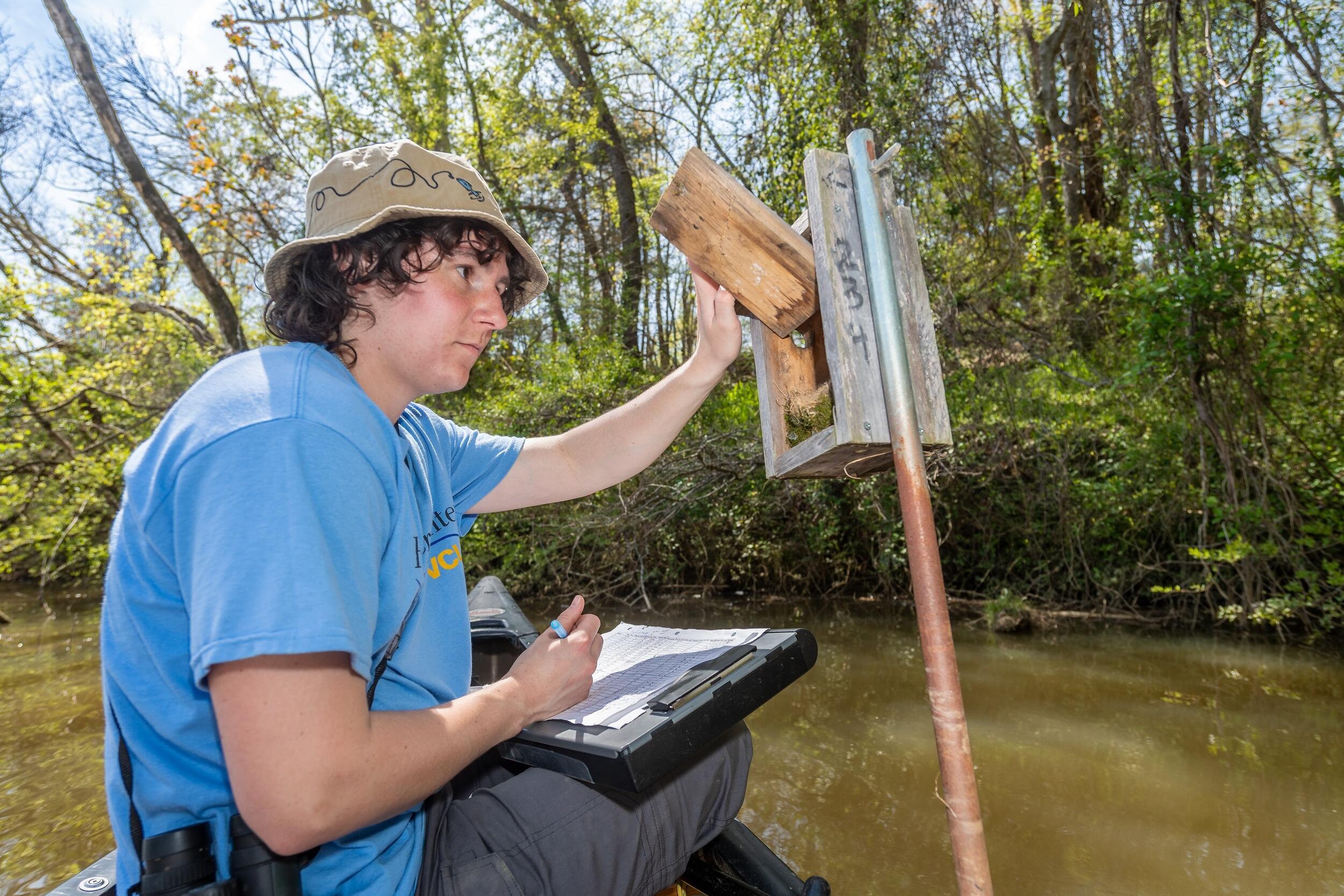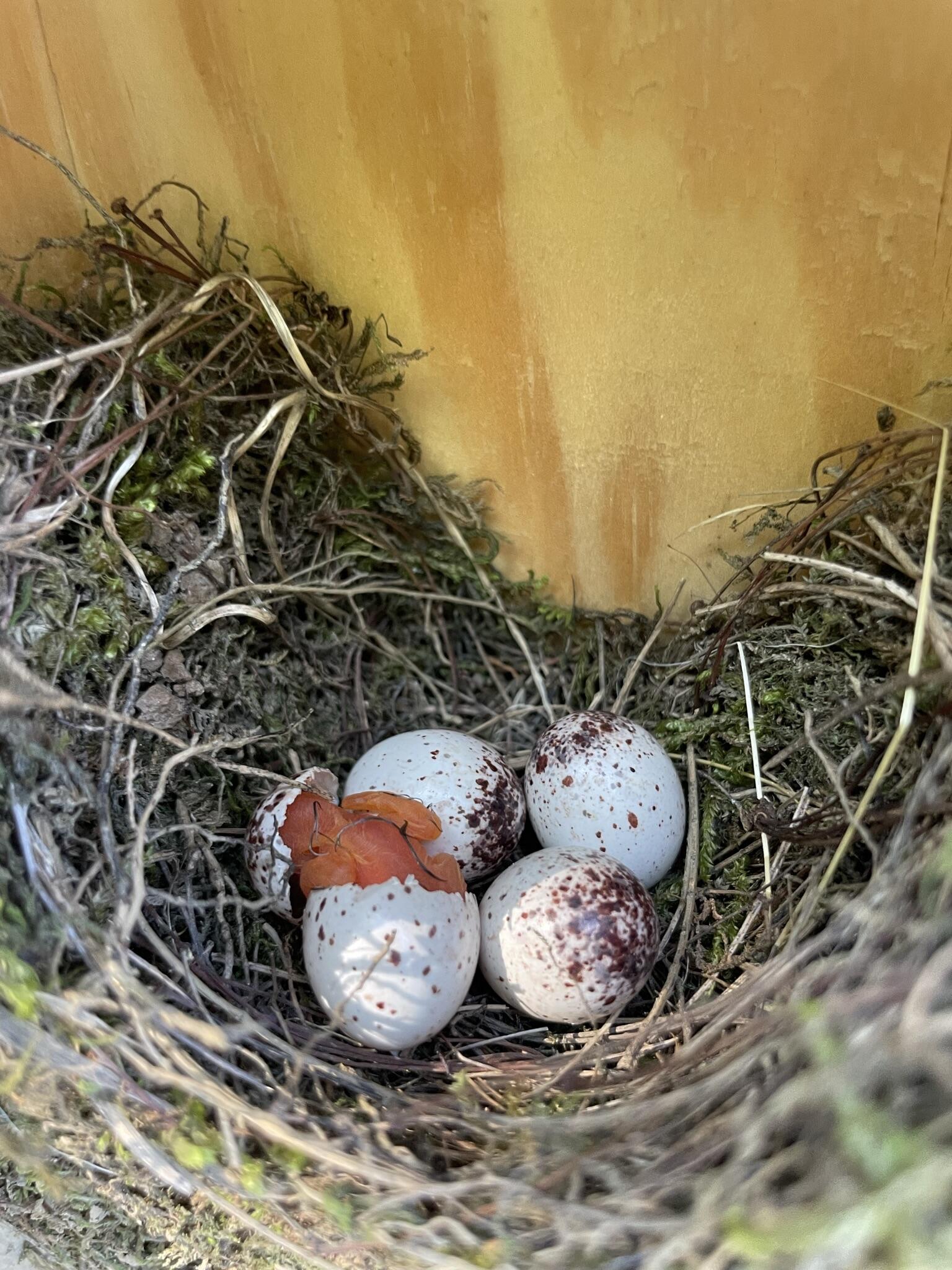
April 15, 2024
Drawn to a nest of secrets, student researcher explores a small songbird’s breeding habits amid a changing climate
Share this story
From his canoe, Juniper Peterson navigates the quiet beauty of the James River – and explores a small creature tied to the big complexities of nature and climate.
Peterson, a Virginia Commonwealth University senior majoring in environmental studies, works in the lab of Lesley Bulluck, Ph.D., an associate professor and avian ecologist in the Center for Environmental Studies. At VCU’s Rice Rivers Center along the James, Peterson’s field research takes him out on the water to check on dozens of shoebox-size birdhouses, which Bulluck’s team mounted on posts that are only reachable during high tide.
Inside, small songbirds – prothonotary warblers – are unwittingly sharing data with Peterson, who is investigating how temperature may affect their reproduction.
“This research is important because it’s going to see if the females change their behavior in response to temperature and climate change,” he said.
Hidden in both the birdhouses and the nests are tiny devices called iButtons that record temperature data. Peterson graphs the data, comparing outside temperatures and several other factors, including the age of the birds, which have been banded and tracked as part of a longitudinal study.
Particularly interesting to Peterson is whether temperature affects the number and duration of times the prothonotary warblers spend on and off the eggs in their nests. He found that the percentage of time spent in the nest peaked at moderate temperatures, and it increased closer to the hatch day. Time spent on the eggs also diminished for older females, prompting more questions.
Understanding incubation can help researchers evaluate hatching success and nestling body condition, factors that affect overall reproductive success of the warblers. It also can highlight how climate change is influencing reproduction.
“Birds may begin raising their young earlier in the season, but then they are more prone to sudden cold flashes, which could kill their nests,” Peterson said. “They would lose a lot of energy during that time.

“My research specifically says that in warmer temperatures, females may have more energy, as they spend fewer days and less time incubating. However, we don’t know if this will have negative consequences to the young, and if they may not hatch.”
While studying the prothonotary warblers at Rice Rivers Center is a long-term project spanning decades for Bulluck and her colleagues, Peterson’s project introduces a new angle, where the iButtons can detect very small temperature changes that tell a whole new story.
“Over the past year, it has been amazing to see Juniper go from interested, to writing a proposal, to collecting the data, to wrangling the data – which was a huge feat,” Bulluck said. “I didn’t even know how to do some of it. We worked together, and Juniper was really persistent, figuring it out. And now we’re at the stage where, ‘Oh my gosh, we have results!’ He presented them at a national conference.”
Receiving grants from the VCU Undergraduate Research Opportunities Program and the Richmond Audubon Society validated Peterson’s dedication and hard work.
“I felt so grateful to get these awards,” he said. “The methods of my study were not inexpensive. It made me feel like I was capable of doing it, like this research was worth my time and my mentor’s time.”
Peterson answered some quick additional questions about his experience as an undergraduate researcher.
What led you to this research?
I grew up in a pretty urban area in Arlington, Virginia, but one of my favorite places to go as a kid was this park with a creek near me that was always polluted because the city didn’t take care of it. But it was very important to me as a kid. That’s where I felt passionate. That made me want to go into environmental studies and then later ecology. I just love everything nature.
What got me into avian ecology specifically was two summers ago, I worked as an intern at Huntley Meadows Park, a wetland reserve in Fairfax, Virginia, as a camp counselor. It’s a popular spot among birders with a lot of migratory bird species in the summer. That was my first experience seeing so many different species of birds. I engaged with the photographers there every day, and I started looking at the birds on my own with binoculars.
Dr. Bulluck teaches an avian ecology and conservation course every spring, [where I learned] about bird anatomy and avian evolution. There’s a lab portion where every Friday morning at 7 a.m., we would go to a different spot around Richmond, usually a park, sometimes on the James River, and we would birdwatch and learn the different names of birds, how to identify them by sight and sound, rain or shine.
I started working with Dr. Bulluck my junior year. She offered me the opportunity to do my own research project, which was very unexpected to me, but I was very glad.
Beyond the research itself, what skills or connections have you developed through this project?

The field skills I have learned in relation to avian ecology are game-changing. It definitely sets me up to work with birds in the future.
In terms of research, I feel much more experienced and more passionate. I have gained a lot of skills in grant writing, data collection and data analysis. I’ve learned a lot about the programing language R, which I use to conduct all my data analysis. I’m hoping to publish two manuscripts in the next year about this research, and that definitely opens the doors to graduate school.
Recently, I attended my first conference, the Association of Southeastern Biologists conference, and [did] a poster presentation on my research. I was able to network and look into a few different schools I would like to apply to for graduate school. Overall, this really opened a lot of doors for me.
What did you enjoy most about this project?
One of the most enjoyable things about this project was definitely collecting the data at the Rice Rivers Center. We check these prothonotary warbler nest boxes by going out in the canoe early in the morning, usually. This is just a lovely experience being in a canoe for a few hours, collecting data. It’s very peaceful. We got to hold birds; that was just amazing.
Even what might be considered the nitty-gritty work of data analysis, I consider that really fun as well. It’s like a puzzle to me. I used a lot of problem-solving abilities, but that was also the most challenging part of the process. I had to learn to code better. I had to rely on online resources and learn to apply these to my projects specifically.
What advice do you have for other undergrads on how to get involved in research?
Go for it. I had very little field experience. Before I talked to Dr. Bulluck, I had just taken one class in data analysis, so I was very unsure of myself. But it’s one of those things where you’re not going to get it unless you ask. Talk to your professor, see what’s around – even just applying for different internships and gaining different field experiences will lend themselves well to research.
Subscribe to VCU News
Subscribe to VCU News at newsletter.vcu.edu and receive a selection of stories, videos, photos, news clips and event listings in your inbox.










